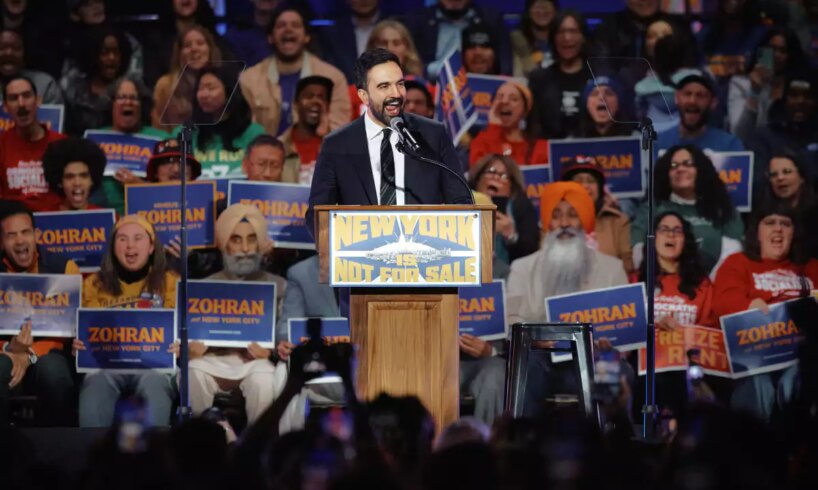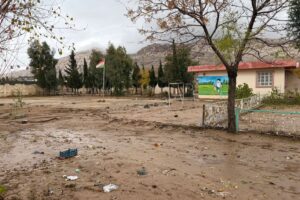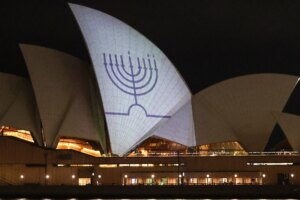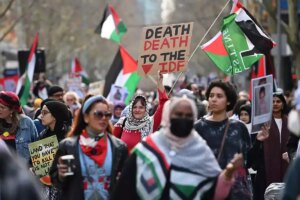
The tense mayoral race in New York City will reach its conclusion next Tuesday, with many in the Jewish community fearing the possibility that socialist-Democratic candidate Zohran Mamdani, who has consistently led in polls, will be elected to the position. Mamdani, known for his sharp statements against Israel, raises serious questions about the future of relations between New York and the Jewish and Israeli communities in the city. To understand how founded these fears are and what a mayor can actually do in these areas, we spoke with Ed Mermelstein, who served until recently as Commissioner for International Affairs under incumbent Mayor Eric Adams, and one of the people who knows the limits of the mayor’s office power closely.
Mermelstein, a Jewish lawyer and businessman with three decades of experience in real estate and international relations, headed the office responsible for the connection between New York and the diplomatic community in the city for four years. This office serves more than 190 countries and 200 delegations. In his position, he led New York’s municipal diplomacy efforts and was among the most prominent in its relations with the Jewish community and with Israeli diplomatic representatives in the city.
Ed Mermelstein, who served until recently as Commissioner for International Affairs under incumbent Mayor Eric Adams
“A mayor can influence this area exactly to the extent he chooses to do so,” Mermelstein said. “Much of it relates to language, to tone. If a mayor conveys support for Israel in his language, it affects everything: perception, investments, and businesses. Recently, an article was published that noted Israeli businesses contributed a combined $20 billion to New York’s economy. If a mayor says, ‘We don’t want Israeli businesses in the city,’ it will immediately affect whether companies from Israel will want to come and invest here.”
According to him, this involves not only an economic but also a psychological impact – the very public atmosphere affects the sense of security and willingness of Israelis to invest in the city. He emphasized the damage would be double. “It will harm the city itself, which will lose a strong economic player, and also Israeli businesses, which won’t get exposure to the largest market in the world. However, it’s essential to remember that no mechanism can prevent a company from establishing a business in New York, as long as it’s not subject to federal sanctions. Therefore, I actually encourage Israeli companies to continue coming, to show their strength, and to understand that every mayor is temporary. The businesses remain long after him.”
One of the central issues raised is the public security aspects of the Jewish community. “A major concern of many Jews, including mine, is security,” he said. “A mayor can choose whether to allocate resources to securing synagogues and Jewish institutions, or not. It’s not just the mayor himself, but also the people he brings with him to City Hall. If he appoints people who believe Israeli businesses shouldn’t come to New York, or who in certain cases might feel Jews are unwelcome in the city, that could be very disturbing.”
He shared a personal experience. “In London, a close Muslim friend told me I shouldn’t walk around with a Star of David. That was shocking. In New York, I never thought that way, but in the past two years, I’ve started to worry, also for my children.”
According to him, there are areas where a mayor can indeed take practical steps, even if limited. “For example, he might be able to interfere in municipal universities’ relations with Israeli bodies, but not in state institutions or private institutions. There are also areas where he has indirect influence, such as through the appointment of the police commissioner. Suppose a mayor appoints a police chief according to his worldview. In that case, he can definitely influence, for example, closing the New York Police Department’s representation in Israel, or even permits for the annual Israel parade on Fifth Avenue. I hope that won’t happen, but it’s a possibility.”
He emphasized that tone alone could have implications far beyond the city’s borders. “New York is under a global microscope. What happens here is immediately watched around the world. If New York adopts a tone similar to that of London or Paris, it could set the tone not only in the US but also worldwide. And when Jews start to fear walking in the street, that’s already reality.”
Regarding the fear of deteriorating security, he recalled a precedent. “We saw in the days of Bill de Blasio (former mayor) how violence and property destruction received legitimacy, when city hall chose not to intervene. If a police commissioner decides not to allocate forces to a dangerous hotspot, that’s a recipe for disaster. I hope we won’t go back there.”
Finally, he called on the Jewish community to maintain its proportion, but not to succumb to complacency. “New York is the most resilient city in the world, maybe only after our partners in Israel,” he said. “Every mayor passes, and this city will remain. I hope that whoever is elected will prioritize the security of all the city’s residents, regardless of their religion or origin. I no longer hold an official position. I’m a New York citizen, looking at the city’s future with concern and hope. There’s a lot of fear in the air, but I believe the next leader of New York will do the right thing.”





